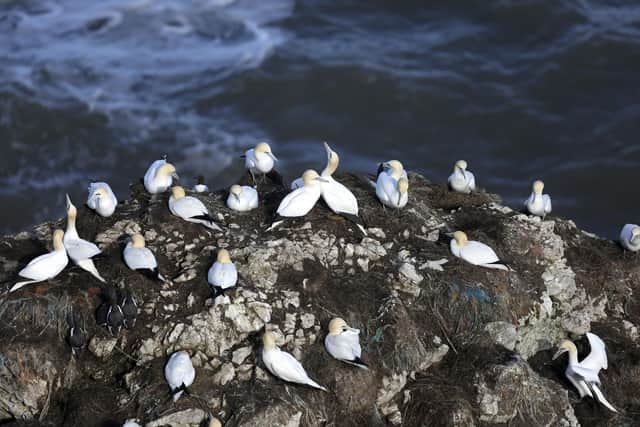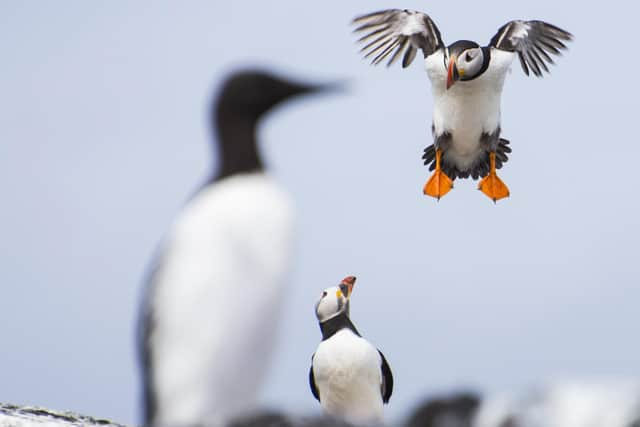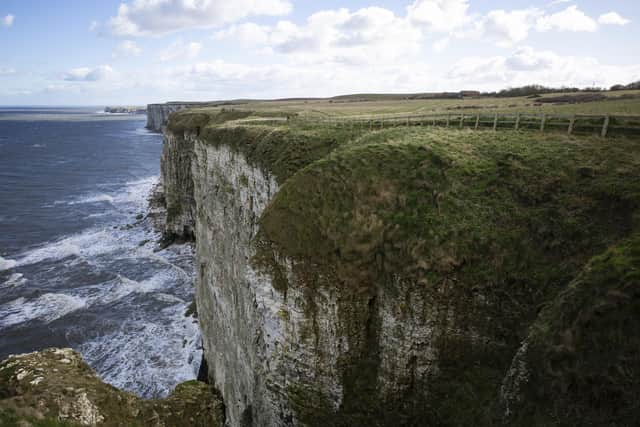Climate crisis is making seabirds in Yorkshire the most threatened group of birds in the world
Wild Isles shows the wildlife and wild places of the United Kingdom as never before.
The five-part series is a unique collaboration between the RSPB, WWF and The Open University, working with the BBC and Silverback Films.
Advertisement
Hide AdAdvertisement
Hide AdIn the major new landmark series, Sir David Attenborough will celebrate the wonders of the islands that we call home, revealing the surprising and dramatic habitats that exist right on our doorstep.


Filmed over the course of three years, this new five-part series will investigate how our woodland, grassland, freshwater and ocean habitats support wildlife of all kinds.
The first of five episodes of this new BBC series aired to the public on BBC One and iPlayer on Sunday.
Across the five episodes, the crew filmed in 145 locations over 3 years and over those episodes, the crew filmed 96 species.
Advertisement
Hide AdAdvertisement
Hide AdThe RSPB is the UK’s largest nature conservation charity, protecting habitats, saving species and delivering conservation work across England, the UK and internationally.


At RSPB Bempton Cliffs, in East Yorkshire, the RPSB has been working to provide and protect habitats for threatened species like puffins, gannets and kittiwakes, but their food source, sandeels, are becoming harder to find because of climate change and human activity.
As sea temperatures rise, the fish these seabirds rely on swim deeper in search of cooler waters, making it much harder for diving birds to find a meal. These small fish are critical for seabirds, including some of our most threatened species, this in turn is affecting their overall productivity, meaning they produce fewer chicks each year and which affects the whole species. Without urgent intervention, things will only get worse.
Site manager, Dave O’Hara, said: “Global seabird populations have declined by 70 per cent since 1950, making seabirds the most threatened group of birds in the world. Lots of our seabirds here at Bempton Cliffs have been affected.
Advertisement
Hide AdAdvertisement
Hide Ad“We predict that the UK’s puffin population could reduce 90 per cent by 2050 if global temperatures continue to rise unchecked. They’re facing threats to both their nesting sites and their food supply, and the climate crisis is only making things worse.”


Every year, the RSPB’s seabird research team carries out our seabird monitoring programme along the cliffs of Bempton, Flamborough, and Filey. This is carried out by a seabird research team, reserve staff and lots of dedicated volunteers.
Visitor experience manager, Poppy Rummery, added: “Bempton Cliffs nature reserve is a special place. The Flamborough and Filey Coast Special Protected Area supports the largest mainland seabird colony in England. The 5km of sea cliffs are internationally important because of the huge numbers of seabirds, including puffins, gannets, kittiwakes, guillemots and razorbills, which raise their young here in spring and summer.
“Due to the nature of the site, the importance of the seabird colony that calls this place home, and the level of site protection we have here, Bempton is the ideal place to monitor seabirds."
Advertisement
Hide AdAdvertisement
Hide AdYorkshire was featured as a filming location to show off diverse geology in the UK.
The team behind the series, who have worked at locations across the world wanted to show off The British Isles because it has some of the most varied geology on the planet.
Temperatures range from subtropical in the far south to arctic conditions on the top of the Cairngorms in Scotland, the coastline is more than 22,000 miles long and benefits from the warming effect of the Gulf Stream.
Our position on the globe is perfect for summer visitors from the south and winter visitors from the north and all these factors combine to create one of the richest natural histories in Europe.
Advertisement
Hide AdAdvertisement
Hide AdWe have more ancient oak trees than the whole of Europe put together, most of the world’s chalk streams flow in southern England and we are globally important for the sea birds.
Beccy Speight, CEO of RSPB, said: “All of us at the RSPB have felt so privileged to contribute alongside our fellow co-producers WWF and The Open University.
"Wild Isles is a once-in-a-generation celebration of UK wildlife, but it’s also a stark warning of how much we have to lose. Our experts were among those who provided guiding science and advice, as well as offering our amazing reserves to film everything from dragonflies to golden eagles.
"We can’t wait to see what action is sparked by this milestone series - nature is in crisis, but we know that together we can save it.”
